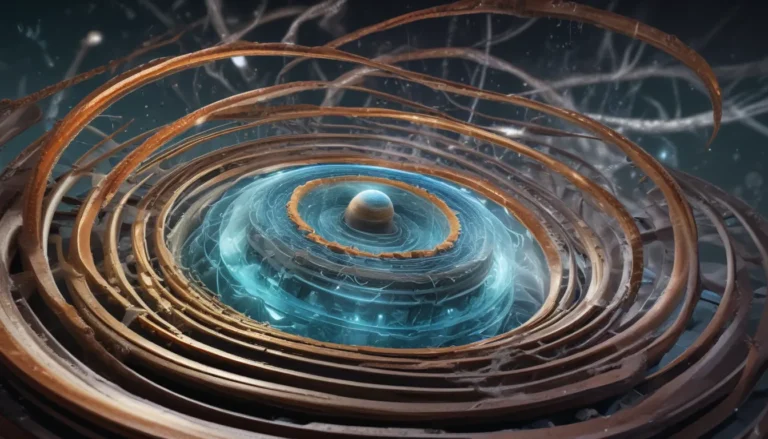A Note About Images: The images used in our articles are for illustration purposes only and may not exactly match the content. They are meant to engage readers, but the text should be relied upon for accurate information.
Are you ready to embark on a journey into the fascinating realm of conservation laws? These fundamental principles in physics serve as the guiding light that illuminates the intricate workings of the universe. From the conservation of energy to the conservation of momentum and angular momentum, these laws are the building blocks upon which we decipher the mysteries of the cosmos.
Conservation Laws: The Rules of the Universe
Conservation laws are like the secret codes of the universe, revealing how various physical quantities remain constant over time, keeping everything in balance. They provide us with a framework to understand the world around us, from the behavior of energy to the interactions of particles. These laws serve as the cornerstone of our knowledge, guiding us through the complexities of the physical world.
The Law of Conservation of Energy
The law of conservation of energy dictates that energy cannot be created or destroyed, only transformed from one form to another within an isolated system. This principle is vital in unraveling how energy is transferred and utilized in different physical processes.
The Law of Conservation of Momentum
The law of conservation of momentum states that the total momentum of a closed system remains constant in the absence of external forces. This law is instrumental in explaining the motion of objects and plays a crucial role in understanding collisions and particle interactions.
The Law of Conservation of Angular Momentum
The law of conservation of angular momentum asserts that the total angular momentum of a closed system remains unchanged when no external torques are present. This law is essential in elucidating the motion of rotating objects and has applications in fields such as astronomy and mechanics.
Conservation Laws and Symmetry
Conservation laws are intricately linked to the concept of symmetry in physics. The conservation of energy, for instance, is associated with the time symmetry of physical laws, while the conservation of momentum is related to spatial symmetry.
Delving Deeper: Conservation Laws in Different Fields
Conservation Laws in Particle Physics
The Standard Model of Particle Physics relies heavily on conservation laws to describe the behavior of elementary particles and the fundamental forces of nature. These laws ensure that certain properties remain constant and guide the interactions between particles.
Conservation of Charge
The conservation of charge is a fundamental principle in physics, stating that the total electric charge in a closed system remains unchanged. This law helps elucidate the behavior of electrical phenomena and is pivotal in the field of electromagnetism.
Conservation Laws and Thermodynamics
The laws of thermodynamics, which govern energy transfer and heat behavior, are grounded in the principles of conservation. The first law of thermodynamics, also known as the law of energy conservation, dictates that the total energy of an isolated system remains steady.
Conservation Laws in Astrophysics
Conservation laws play a significant role in astrophysics, aiding in the understanding of celestial objects’ behavior. The conservation of angular momentum, for example, sheds light on the formation and rotation of stars and galaxies.
Conservation of Mass-Energy
The iconic equation E=mc², derived from the theory of relativity, stems from the conservation of mass-energy. This equation showcases the equivalence between mass and energy, illustrating how they can be transformed interchangeably.
Conservation of Baryon and Lepton Numbers
In the realm of particle physics, the conservation of baryon number and lepton number are vital principles. These laws dictate that the total numbers of baryons and leptons in a system remain constant during particle interactions and decays.
Exploring the Boundless Universe of Conservation Laws
As we dissect the intricate details of conservation laws, we uncover a universe governed by fundamental principles that shape our understanding of the physical world. From classical mechanics to electromagnetism and quantum mechanics, these laws pave the way for scientific advancements and technological innovations.
Conclusion: Embracing the Essence of Conservation Laws
Conservation laws stand as the bedrock of physics, offering profound insights into the workings of the universe at both macroscopic and microscopic scales. By unraveling the mysteries of these laws, we navigate a path to deeper comprehension of our surroundings, embarking on a journey of discovery and enlightenment.
FAQs: Navigating the World of Conservation Laws
-
What are conservation laws in physics?
Conservation laws in physics are fundamental principles that dictate the constancy of certain physical quantities in a closed system. -
Why are conservation laws important?
Conservation laws provide a framework for understanding and predicting the behavior of physical systems, serving as guiding principles in the exploration of the universe. -
Can conservation laws be violated?
While conservation laws are generally considered immutable, there may be instances where external factors influence their apparent violation.
By immersing ourselves in the enigmatic world of conservation laws, we uncover the intricate tapestry of the universe’s fundamental principles. As we continue to delve into the depths of physics, the study and application of conservation laws will remain pivotal, shaping our understanding of the cosmos and propelling us toward new horizons of scientific discovery. Join us on this exploration of the wonders of conservation laws, where each revelation unveils a new layer of the universe’s intricate design and profound beauty.






